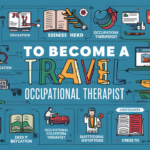Exploring the Path: How to Become a Travel Nurse
A travel nursing career offers an exciting and rewarding opportunity for registered nurses to explore new places while providing essential healthcare services. Travel nurses fill temporary positions in healthcare facilities across the country, allowing them to gain diverse experiences and meet new people. If you’re wondering how to become a travel nurse, this guide will provide a comprehensive overview of the steps and qualifications needed to embark on this fulfilling career path.

Content
Understanding the Role of a Travel Nurse
A travel nurse is a registered nurse (RN) who takes short-term assignments at various healthcare facilities, often in different locations. Travel nurses perform the same duties as regular staff nurses, including patient care, administering medications, and collaborating with healthcare teams. However, they have the added responsibility of quickly adapting to new environments and protocols.
Skills and Qualifications Needed
To thrive in a travel nursing career, certain skills and qualifications are essential:
Essential Skills
- Strong clinical skills and knowledge
- Adaptability and flexibility
- Excellent communication and interpersonal skills
- Problem-solving abilities
- Cultural competence and sensitivity
Educational Qualifications
To become a travel nurse, you must first complete a nursing education program and obtain a degree, typically an Associate Degree in Nursing (ADN) or a Bachelor of Science in Nursing (BSN).
Required Certifications and Licenses
In addition to your nursing degree, you’ll need to obtain various certifications and licenses:
- Basic Life Support (BLS) certification
- Advanced Cardiovascular Life Support (ACLS) certification
- Nursing license (NCLEX-RN)
Steps to Become a Travel Nurse
Completing Nursing Education and Obtaining a Degree
Enroll in and complete an accredited nursing program, earning either an ADN or BSN. A BSN is often preferred by employers and may open more opportunities.
Gaining Clinical Experience
Most travel nursing agencies require at least one to two years of clinical experience in your specialty. This experience is crucial for building your skills and confidence.
Obtaining Necessary Certifications
Ensure you have current BLS and ACLS certifications. Additional certifications in your specialty area can also enhance your qualifications.
Acquiring a Nursing License
Pass the NCLEX-RN exam to obtain your registered nursing license. Depending on where you plan to work, you may need additional state licenses. The Nurse Licensure Compact (NLC) can simplify this process for nurses working in participating states.
Finding Travel Nursing Jobs

Researching and Selecting Travel Nursing Agencies
Choose reputable travel nursing agencies that align with your career goals. Look for agencies with positive reviews, good benefits, and strong support systems.
Applying for Travel Nursing Positions
Submit applications to your chosen agencies. Be prepared to provide your resume, references, and proof of certifications and licenses.
Interviewing and Negotiating Contracts
Participate in interviews with potential employers. Discuss contract terms, including salary, housing, and assignment length, to ensure they meet your expectations.
Preparing for a Travel Nursing Assignment
Arranging Housing and Travel Logistics
Many travel nursing agencies offer housing options or stipends. Plan your accommodation and travel logistics in advance to ensure a smooth transition.
Understanding Contract Terms and Conditions
Carefully review your contract, noting details such as assignment length, work schedule, and responsibilities. Clarify any uncertainties with your agency.
Preparing for the New Work Environment
Familiarize yourself with the healthcare facility, its protocols, and the local area. Being well-prepared will help you adapt quickly and perform effectively.
Challenges and Rewards of Travel Nursing
Common Challenges
- Adapting to new environments and protocols
- Navigating different healthcare systems
- Managing work-life balance
Benefits and Rewards
- Higher pay and benefits
- Opportunities to travel and explore new places
- Gaining diverse clinical experiences
- Building a versatile skill set
Conclusion
Becoming a travel nurse involves a combination of education, clinical experience, and adaptability. By following these steps and continuously honing your skills, you can build a successful and rewarding travel nursing career. Whether you’re seeking adventure, professional growth, or the opportunity to make a difference in diverse communities, travel nursing offers a unique and fulfilling path in the healthcare industry.












